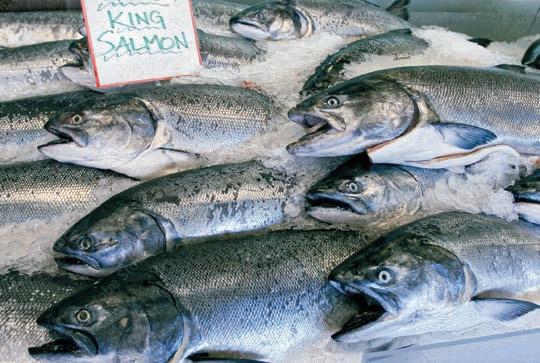
2 minute read
ON THE BAY GONE FISHING
Why there is no local salmon this summer and a health check on the Monterey Bay STORY AND PHOTOGRAPHY BY
When Santa Cruz resident Corey Ridings isn’t surfing or coaching golf at Branciforte Middle School, she’s “gone fishing.”
Advertisement
As a voting member of the Pacific Fishery Management Council (PFMC)—appointed in 2021 by U.S. Commerce Secretary Gina Raimondo and California Gov. Gavin Newsom—and the first member who also works for a major ocean advocacy group, her job is to manage all things fisheries on the West Coast.
Ridings and fellow PFMC members recently made the tough decision to ban commercial and recreational fishing of Chinook (king salmon) for the 2023 season.
“Scientific estimates show very low numbers of fish,” she explains, and the number of king salmon expected to return to California rivers this year is near record lows.
“At the most basic level, California has had so much habitat degrada-
JEFF BAREILLES
tion of our streams, rivers and estuaries that it has become incredibly difficult for salmon to complete their life cycle,” she says. “King salmon require cold and clean freshwater to survive, but water policy and California’s years of drought and warming water temperatures due to climate change have inhibited the salmon from spawning for the past two to three years.”
The water policy Ridings refers to is the 2019 federal act that diverts water from its river ecosystems, that support fish protected by endangered species laws, to the state’s Central Valley farmers.
By law, the U.S. government is supposed to rely on scientific data to strike a balance between the two. But in this case, the Trump Administration ordered California to re-engineer its water plans, overlooking scientific research and biological opinions. California sued to overturn the act and the Trump Administration counter-sued. Ultimately a com- promise was reached to divert less water to farmers than initially planned.
Unfortunately, the compromise, combined with years of drought, cut off salmon from the mountain rivers, where they cool off in summer, and from the floodplains, rich with bugs, where they pack on weight in winter and spawn. This has resulted in complete closure of king salmon season in California and most of Oregon.
Coastal communities that rely on king salmon fishing season are experiencing the combined effect of climate change and water policy.
“The ban very much affects the livelihoods of fishing communities. It’s incredibly sad and will be tough for folks,” says Ridings. “But, also note that salmon fisheries are important for some of California’s Tribes who have harvested and depended on salmon since time immemorial.”

“Fishermen from both the commercial and recreational sectors are largely supportive of the ban. They understand that scientific estimates show very low numbers of fish, and they understand the need to protect the species for the future," she says.
As for Ridings, her bond with fish runs deep. She’s the manager of fish conservation at Ocean Conservancy—the global organization at the forefront of ocean protection. Here Ridings has been measuring the effect of climate change on fish since 2013.
Earlier, Ridings studied marine biology at Occidental College and earned a master’s degree in public health from Yale University. After graduation she was an epidemiologist in Michigan, where she worked with racial and ethnic minority communities to improve disparities in health outcomes and shape state policy. Then she served as a Peace Corps volunteer in the Philippines, developing sustainability projects with local fishing communities.
Presently, she’s pursuing a doctorate in environmental management at the University of Washington, working on fishery and public health issues related to the fishing community and ecosystem sustainability.









